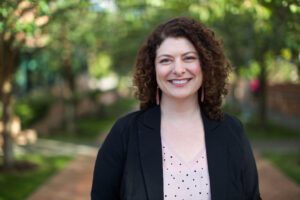By Lauren Low
When someone is undergoing treatment, it’s hard. You know that. I know that. The person at the grocery store who quickly glanced at someone’s head wrap knows that. What most people do not know is how incredibly challenging the next phase of care is after they’re done with the “active” part of treatment.
As a Physician Assistant at a major cancer center, I saw this day in and day out. During treatment, patients have a clear plan and the support and guidance of their medical team. But once they’re in remission or going into “maintenance,” they often feel lost and unsure of what to do next: Am I the only one who feels more anxious now? When will I feel “normal” again? When can I do [THIS] activity?

Unfortunately, many patients are not adequately prepared for this transition, and medical teams can sometimes forget to provide guidance for the next chapter.
I have seen many patients who are years out of treatment and still finding it difficult to adjust. Some of them struggle with not knowing what they should be doing in terms of exercise, nutrition and monitoring their symptoms. For others, it’s challenging to reintegrate themselves into regular life with family, friends or peers since they now have entirely different life experiences. And of course, it’s common for cancer survivors to struggle with planning for the future because of the possibility of the cancer returning and disrupting everything again.
All of these feelings are understandable and valid. I find it rewarding to help people through the transition after cancer treatment. However, there is a significant time constraint in modern healthcare, which only allows for 20-minute appointments with patients. This is not enough time to cover everything that needs to be discussed from both my perspective and that of the patients.
I have personally witnessed the positive impact of support groups, like those provided at Cancer Support Community North Texas, have on patients during their recovery process. Those who joined support groups geared toward “life after treatment” or sought out licensed therapists with a cancer specialty had a noticeable improvement in their demeanor. They were happier, more engaged with others and more motivated to pursue personal growth activities, such as learning a new hobby or starting an exercise routine.
I had a 72-year-old patient who discovered a love for creative writing and published a memoir, and another patient who benefited so much from yoga after treatment that she began teaching her own classes to others at the cancer center.
From my perspective, getting plugged in with CSCNT is essential. They have a staff of experts dedicated to providing support, guidance, and resources needed during this transitional phase. I encourage anyone affected by cancer to reach out to CSCNT for more information and support.
Interested in joining CSCNT’s Life After Treatment support group? Reach out to info@cancersupporttexas.org for more information. Check out our complete list of support groups here, and view all our activities, including yoga and other healthy lifestyle classes, on the calendar.